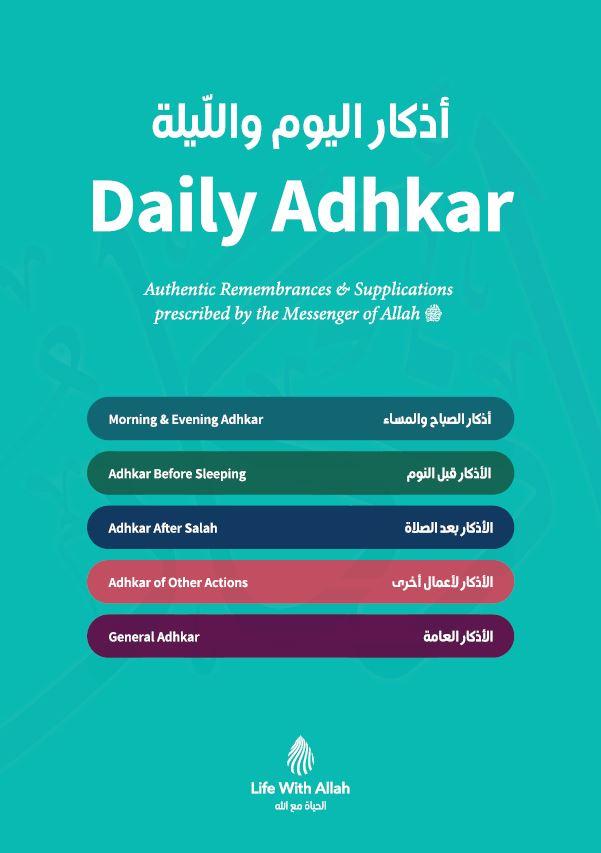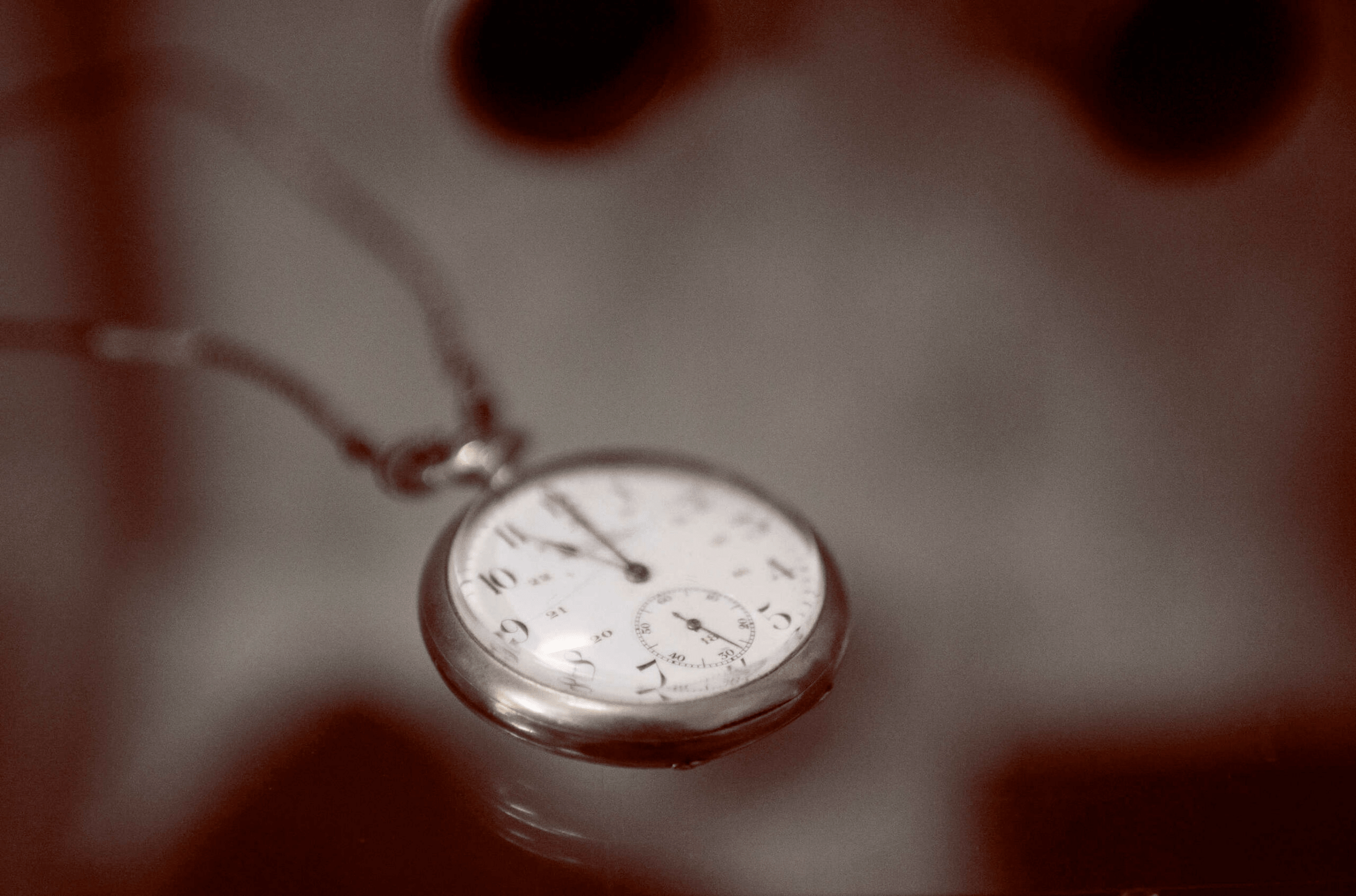The morning and evening adhkār are a collection of duʿās and remembrances established by the Messenger of Allah ﷺ. A Muslim should recite these on a daily basis in the morning and evening.
Allah (subḥānahū wa taʿālā) instructs the Prophets (ʿalayhimu-salām) and the believers to remember Him in the morning and the evening in over 15 āyāt of the Qur’ān. Allah (subḥānahū wa taʿālā) says:
يٰٓأَيُّهَا الَّذِيْنَ آمَنُوا اذْكُرُوا اللهَ ذِكْرًا كَثِيْرًا. وَسَبِّحُوْهُ بُكْرَةً وَّأَصِيْلًا
“Believers, remember Allah often and glorify Him morning and evening” (33:41-42).
Through the morning and evening adhkār, we remain in awe of the greatness of Allah throughout the day. Through them, we seek His love, we draw closer to Him, and we feel content and at ease. And through them, we gain the strength to carry out our daily tasks, because the one who starts and ends his day with the remembrance of Allah and places his trust in al-Ḥayy al-Qayyūm (The Ever Living, The All-Sustainer) is sufficed by Him.
The morning and evening adhkār are a protection from all types of evil, including envy, magic, the evil eye and the devils’ evil plotting. We should try to recite these adhkār with understanding, conviction (yaqīn) and the presence of our hearts, on a daily basis.
“From amongst the most rewardable and virtuous forms of remembering Allah are the morning and evening supplications (which are established in the Sunnah). This is because they include all-encompassing forms of protection and benefits. Therefore, whoever wishes to remain secure from all types of calamities in this world, and to enjoy short-term and long-term success — he should hold on tight to these supplications and recite them every morning and evening.” – al-Shawkānī (raḥimahullāh)
The morning, evening and the last part of the night are the three special times in which a servant should worship Allah, as instructed by the Messenger of Allah ﷺ. We worship Allah in the morning and the evening through both obligatory and optional actions:
1) Obligatory Actions
The obligatory actions are praying Fajr and ʿAṣr, and these are the best two prayers from the farḍ prayers. These two prayers are performed during ‘the two cool periods’ and whoever preserves these two prayers shall enter Paradise (Bukhārī).
2) Optional Actions
The optional – and highly recommended – actions are to be carried out after Fajr and ʿAṣr. Thus, after the farḍ prayers, we should give a portion of our time to each of the following:
1) Recitation of the Qur’ān
2) Dhikr
3) Duʿā’.
When Should the Morning & Evening Adhkar be Read?
The best time for the morning adhkār is between Fajr and sunrise and the best time for the evening adhkār is between ʿAṣr and sunset.
However, if you are unable to recite them during the above times, you can make up for them. For example, in the summer if you went back to sleep after Fajr, then you can make up for them after waking up.
“The verses of the morning and evening adhkār encourage starting and ending the day with dhikr. This is so that one may commence and end with the worship of Allah, and the dhikr will expiate for the sins perpetrated in between these two periods.” – al-Nawawī (raḥimahullāh)
Do I Have to Recite All of the Adhkar?
It is highly virtuous to recite all of the adhkār. If we cannot recite them all, we should try to be consistent with at least some of them.
Imām al-Nawawī (raḥimahullāh) writes, “Whoever is granted tawfīq (divine enablement) of performing the morning and evening adhkār, then this is a blessing and a favour from Allah upon him. Congratulations to him! And whoever is unable to perform all of them should limit himself to what is concise, even if it is only one dhikr.”
How to Recite the Morning and Evening Adhkar
Allah (subḥānahū wa taʿālā) says,
وَاذْكُرْ رَّبَّكَ فِىْ نَفْسِكَ تَضَرُّعًا وَّخِيفَةً وَّدُوْنَ الْجَهْرِ مِنَ الْقَوْلِ بِالْغُدُوِّ وَالْـَٔاصَالِ وَلَا تَكُنْ مِّنَ الْغَـٰفِلِيْنَ
“Remember your Lord within yourself, with humility and in fear, without raising your voice, in the mornings and in the evenings. And do not be one of the heedless.” (7:205)
This āyah highlights seven key etiquettes of performing dhikr:
1) Dhikr should be performed ‘within yourself ’ (in harmony with the tongue). This is more conducive to sincerity, keeps one safe from riyā’ (showing off ) and is more likely to be accepted.
2) Dhikr should be performed with ‘humility’. By acknowledging your deficiencies, you attain the humility necessary for ʿubūdiyyah and reflects on the Greatness of Allah.
3) You should be ‘fearful’ of the shortcomings in your actions and scared that they may not be accepted from you.
4) You should not ‘raise your voice loudly’ as this helps you to reflect on the dhikr.
5) Dhikr should be with the tongue and not just the heart. This can be seen in ‘without raising your voice,’ i.e. you should utter it but not raise your voice.
6) You should perform dhikr ‘in the mornings and the evenings.’ This āyah indicates the virtue of these two times because they are both times of tranquillity and worship. The actions of the servant are raised in the beginning and at the end of the day, and thus you should commence and end your day with dhikr.
7) The prohibition of being ‘amongst the heedless.’ This is a reminder to be consistent in remembering Allah, as “the most beloved deeds to Allah are those which are consistent, even if they are few” (Bukhārī). (Adapted from Maḥāsin al-Ta’wīl)











